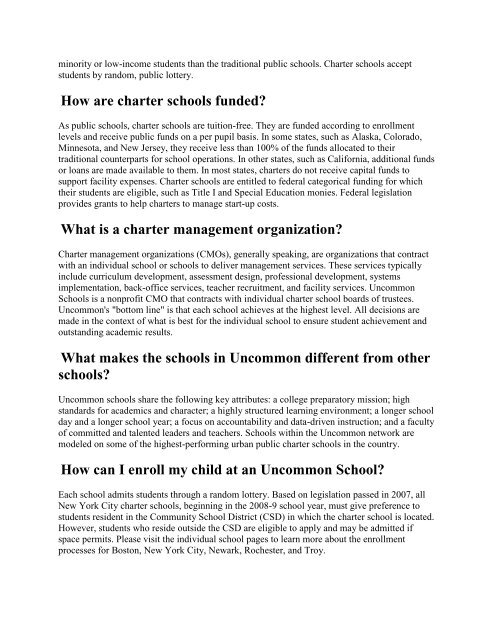The 21st Century Charter Schools Initiative
The 21st Century Charter Schools Initiative
The 21st Century Charter Schools Initiative
You also want an ePaper? Increase the reach of your titles
YUMPU automatically turns print PDFs into web optimized ePapers that Google loves.
minority or low-income students than the traditional public schools. <strong>Charter</strong> schools accept<br />
students by random, public lottery.<br />
How are charter schools funded?<br />
As public schools, charter schools are tuition-free. <strong>The</strong>y are funded according to enrollment<br />
levels and receive public funds on a per pupil basis. In some states, such as Alaska, Colorado,<br />
Minnesota, and New Jersey, they receive less than 100% of the funds allocated to their<br />
traditional counterparts for school operations. In other states, such as California, additional funds<br />
or loans are made available to them. In most states, charters do not receive capital funds to<br />
support facility expenses. <strong>Charter</strong> schools are entitled to federal categorical funding for which<br />
their students are eligible, such as Title I and Special Education monies. Federal legislation<br />
provides grants to help charters to manage start-up costs.<br />
What is a charter management organization?<br />
<strong>Charter</strong> management organizations (CMOs), generally speaking, are organizations that contract<br />
with an individual school or schools to deliver management services. <strong>The</strong>se services typically<br />
include curriculum development, assessment design, professional development, systems<br />
implementation, back-office services, teacher recruitment, and facility services. Uncommon<br />
<strong>Schools</strong> is a nonprofit CMO that contracts with individual charter school boards of trustees.<br />
Uncommon's "bottom line" is that each school achieves at the highest level. All decisions are<br />
made in the context of what is best for the individual school to ensure student achievement and<br />
outstanding academic results.<br />
What makes the schools in Uncommon different from other<br />
schools?<br />
Uncommon schools share the following key attributes: a college preparatory mission; high<br />
standards for academics and character; a highly structured learning environment; a longer school<br />
day and a longer school year; a focus on accountability and data-driven instruction; and a faculty<br />
of committed and talented leaders and teachers. <strong>Schools</strong> within the Uncommon network are<br />
modeled on some of the highest-performing urban public charter schools in the country.<br />
How can I enroll my child at an Uncommon School?<br />
Each school admits students through a random lottery. Based on legislation passed in 2007, all<br />
New York City charter schools, beginning in the 2008-9 school year, must give preference to<br />
students resident in the Community School District (CSD) in which the charter school is located.<br />
However, students who reside outside the CSD are eligible to apply and may be admitted if<br />
space permits. Please visit the individual school pages to learn more about the enrollment<br />
processes for Boston, New York City, Newark, Rochester, and Troy.

















